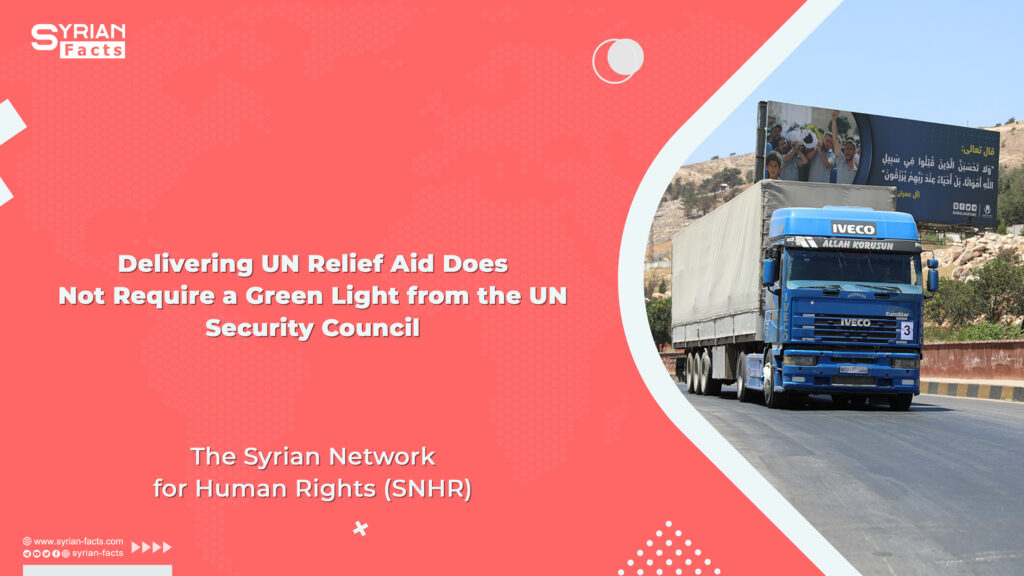According to the UN Office for the Coordination of Humanitarian Affairs (OCHA), no fewer than 4.5 million people are currently living in northwestern Syria. The overwhelming majority of these people have relied for years on cross-border UN relief aid in a region where civilians’ needs are increasingly growing, not least because of the Syrian regime’s attacks on vital facilities and populated areas, with the most recent attack taking place only four days ago, July 4, when a ground-based attack killed a woman in al-Bara town in the southern suburbs of Idlib.
On February 6, a devastating earthquake hit southern Turkey and northern Syria. The Syrian Network for Human Rights (SNHR) released three reports documenting the tragic fallout of the earthquake on Syria and the resultant deaths, numbered at 10,024 Syrian civilian deaths in Turkey and Syria, according to our estimates. Of these, 4,191 Syrians died in non-regime areas, while 394 died in regime-held areas. Moreover, many Syrian refugees returned from Turkey to northwestern Syria, which only dramatically intensified humanitarian needs in the region.
Responding to this humanitarian crisis, the UN Security Council adopted a resolution on February 13, 2023, allowing for delivering aid for a year. However, the Syrian regime, under Russian instruction, undermined the decision, allowing only for delivering UN aid from Turkey to northwestern Syria via the Bab al-Salam and al-Ra’ie Crossings and for no longer than three months, before extending its permission for another three months on May 13.
SNHR was one of the first organizations to stress that delivering cross-border UN aid to Syria does not require a green light from the UN Security Council. In fact, we have released several reports detailing our legal reasoning and the conditions required for the delivery of aid. We have called for years for the international community to unshackle itself from the grip of Russia’s extortion, and take the step of delivering impartial, essential UN relief aid without asking for permission from the UN Security Council.
.
SNHR’s legal position is based on five main reasons:
First: An intervention is unlawful only when it is forcibly carried out. We do not believe that delivering essential humanitarian aid can be classified as a forcible intervention. UN aid workers are unarmed and impartial. Delivering relief aid cannot be seen, by any means, as an intervention in an armed conflict or as a hostile act.
Second: Humanitarian aid passes through Turkey and Iraq. Both states have sanctioned the passage of aid through their territory to areas of Syria under the control of armed opposition factions and the Syrian Democratic Forces (SDF). The controlling forces in the regions for which the aid is destined, meanwhile, welcome the entry of the aid.
Third: Necessity is the decisive issue in regard to this matter, and the delivery of humanitarian aid to northwestern Syria is of paramount necessity.
Fourth: The Syrian regime and Russia are the two primary parties responsible for displacing millions of Syrians in northwestern Syria, and remain the reason why they cannot safely return to their homes.
Fifth: The Syrian regime is stealing the overwhelming majority of relief aid, with only a meager 10 percent of the aid sent reaching those truly in need. This has been repeatedly proven and confirmed and is a well-established fact at this point. The Syrian regime has engineered the theft of relief aid in a calculated and deliberate way that mainly rely on organizations that are completely subservient to the regime
SNHR reiterates that humanitarian assistance must not become an instrument for financing and supporting a regime involved in crimes against humanity. A regime that has displaced and repeatedly committed violations against its own people cannot be relied on, or expected to deliver UN humanitarian assistance, nor to compensate the victims and their families. SNHR also repeat its calls on the UN Security Council to lift its control over UN cross-border relief aid, which is within the scope of the UN General Assembly and theOCHA. The Security Council must also stop allowing the use of veto in a way that directly contradicts international human right law, especially in cases of crimes against humanity, such as forced displacement. Finally, SNHR calls on the UN and donor states to establish an international support platform that would handle the responsibility of coordinating humanitarian assistance in northwestern Syria, where it would serve as an alternative option besides the UN.









Be the first to write a comment.